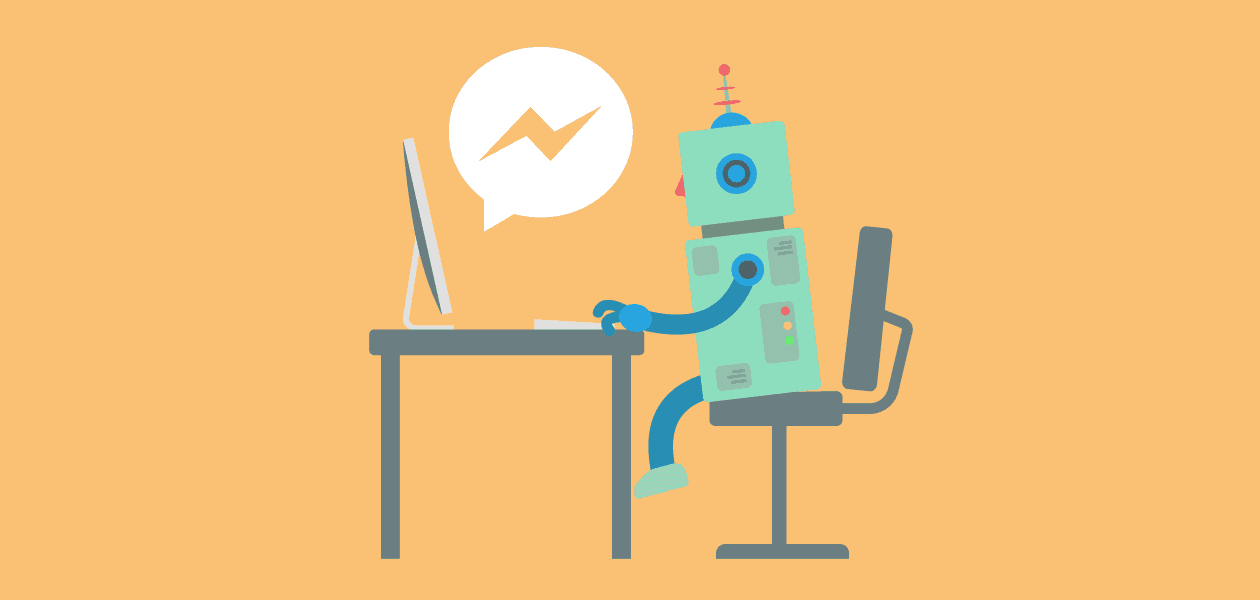
Chatbots - What They Are and How to Use Them
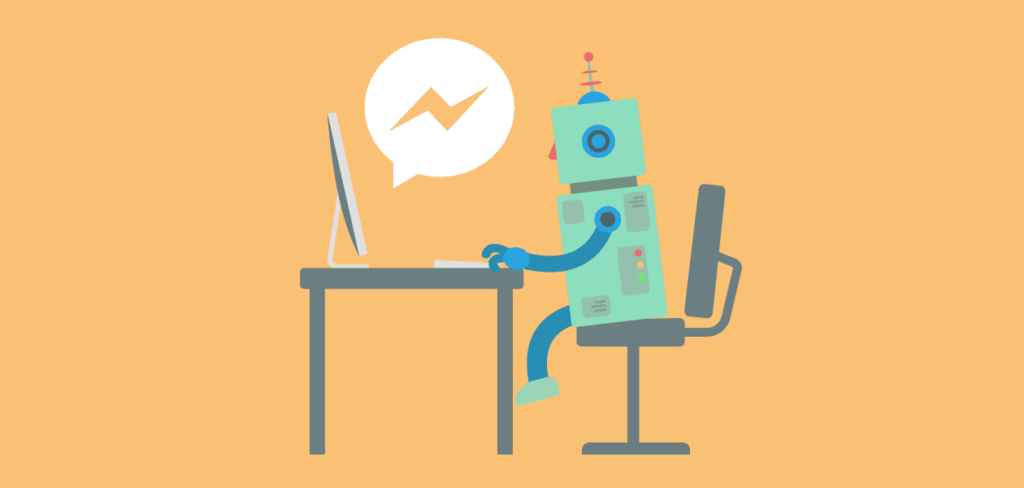
In recent years, there have been waves of progress in the evolution of artificial intelligence. Chatbots are just one of those waves, and they're designed to simplify conversations between humans and computers. With people increasingly moving away from social media sites, many companies have decided to follow them to their favorite messaging apps, like Facebook Messenger, WhatsApp, Skype, and Slack.
Virtual chatbots imitate human conversations and are becoming more and more popular every day. In fact, because these online chatbots save so much time and effort by automating customer support, it was estimated that more than 85% of customer interactions would be handled without a human by 2020.
Chatbots provide lots of opportunities for businesses that go beyond giving a response to a customer's inquiry. They are also used for other tasks such as organizing meetings, reducing overhead costs, and collecting information about users. With all of these benefits, it's no surprise that the chatbot market is growing exponentially.
In this article, we will go over what exactly chatbots are, what value they bring, and how they can be used by businesses.
What is a chatbot?
Chatbots are basically computer programs which are designed to have conversations with human users. More than likely, you've already come across and interacted with one. These chatbots help with multiple things, such as answering questions, providing technical support, guiding you through a purchase, and even teaching you a new language!
Chatbots may use things such as artificial intelligence, machine learning, and natural language processing to perform human tasks. Before going any further in the article, let's go over what these words mean:
- Artificial Intelligence (AI): this is a broad term for the programming of machines to complete intelligent human tasks.
- Machine Learning: This is a type of artificial intelligence that allows computers to interpret information and learn from it. Once a machine has learned it, it is able to use that context to inform a decision next time.
- Natural Language Processing: This is a type of artificial intelligence that processes human language, text, and speech.
While chatbots are not a new business tool, both businesses and consumers have been getting more interested in them over recent years for many reasons. Businesses like chatbots because they allow them to get rid of routine tasks, process multiple requests from users, and help gain customer loyalty. Customers like to interact with chatbots because of:
- Curiosity: Chatbots spark curiosity, and many people want to explore what chatbots can do for them.
- Productivity: Chatbots are able to provide consumers with assistance or information quickly and efficiently.
- Entertainment: Some chatbots amuse consumers by giving them funny tips and provide them with entertainment when they have nothing else to do.
- Social and Relational Factors: Chatbots can fuel conversations. Users can chat with these bots to improve conversational skills, avoid loneliness, and have a chance to talk without judgment.
What types of chatbots are there?
There isn't an official list of the types of chatbots anywhere, but there are experts in the field that have broken them up into categories. Here are the three types of business chatbots:
- Support Chatbots: These chatbots perform one main function, such as walking a customer through a task or answering common questions. These bots generally don't require speech functionality and are easy to navigate.
- Assistant Chatbots: These bots know a little bit about a lot of things and tend to be conversational and entertaining. (Think about Siri and her sassy remarks.)
- Skills Chatbots: These chatbots follow commands and don't require much context. They can also be integrated with other things like appliances and smart devices.
Do keep in mind that many chatbots out there fall into more than one category. There are other ways to break down chatbots as well, such as based on capabilities:
- Keyword Recognition-Based Chatbots: These respond to what you type in based on AI and keywords. When a consumer asks the chatbot a question, it listens to keywords to narrow down an answer.
- Contextual Chatbots: These chatbots use artificial intelligence and machine learning to learn from context, remember conversations, and improve over time.
- Menu or Button Based Chatbots: With these chatbots, consumers click through a series of questions in a button format to get an answer.
Chatbots can also be divided into two large groups depending on how they were programmed:
- Simple Chatbots: These chatbots use pre-written keywords and commands written by the developer using regular expressions or other forms of string analysis. If a user asks a question without using a single keyword, the chatbot will not be able to understand it, and will respond with a message like, "Sorry, I did not understand your question."
- Smart Chatbots: These chatbots rely on artificial intelligence to communicate with users. Rather than responding with pre-prepared answers, the chatbot will respond with adequate suggestions on a topic. In addition to this, the chatbot will record all the words said by the user to process later. Artificial intelligence is not magic though, and these chatbots require a lot of work and coaching.
As you can see, there are multiple ways to think about chatbots, but one of the most important things to know is that you don't need to spend a huge amount of time and resources on building a fancy, complex chatbot. In most cases, a simple chatbot can get the job done just fine.
What value do chatbots bring to a business?
Chatbots can bring tons of value to a business by automating conversations. Here are some key benefits to keep in mind when considering chatbots.
- Chatbots can generate leads and revenue. Chatbots use direct messaging to gather the information they need to provide support to a consumer. For example, in many engagements, a chatbot will ask users why they're visiting a page. By automating this initial interaction, it allows the user to share the information the chatbot needs to better serve them without the need for human help.
- Chatbots can save you time and money. Chatbots allow companies to save time and money that can be allocated elsewhere by automating conversations that would otherwise require a business representative to answer. Rather than having an employee spending a bulk of their time answering a ton of incoming questions, they can reallocate their time to other tasks or relevant conversations.
- Chatbots can provide After Hours support. One popular use of chatbots is to get quick answers in an emergency. Businesses that don't offer 24-hour support won't provide answers when the office is closed, but a chatbot can be useful in giving the customer access to the information they need at any hour of the day or night.
- Chatbots can guide consumers to better outcomes. Customers don't always know where exactly to go to find the information they need. Sometimes customers may not even know what they're interested in - they may have just heard about your business in passing and decided to take a look-see. By asking a series of questions, you can route consumers to the best place to find the information they're interested in.
Questions will vary by business type, but some common examples are:
- What are your goals?
- What problem are you trying to solve?
- Where are you located?
- What industry are you in?
- What department are you in?
- Would you like personal support?
- Chatbots engage with users in a unique way. Traditionally, when a customer had a question, they were routed to businesses through email or the telephone. This process made user experiences fairly standard and non-customized. Now, chatbots offer users a new, engaging, interactive way to engage with businesses.
How can businesses use chatbots?
Chatbots can be used for a plethora of tasks and bring a lot of value to businesses. Below are just a few ways businesses can utilize chatbots.
- Showcase Content: One great example of a chatbot that showcases content is Fandango's Messenger Bot. This chatbot gives consumers a cool interactive experience where they can see which movies are trending, watch trailers, and buy movie tickets. While there are several different ways to buy movie tickets, and what this chatbot ultimately accomplishes is not all too different, it's the experience that it gives users that sets it above the competition.
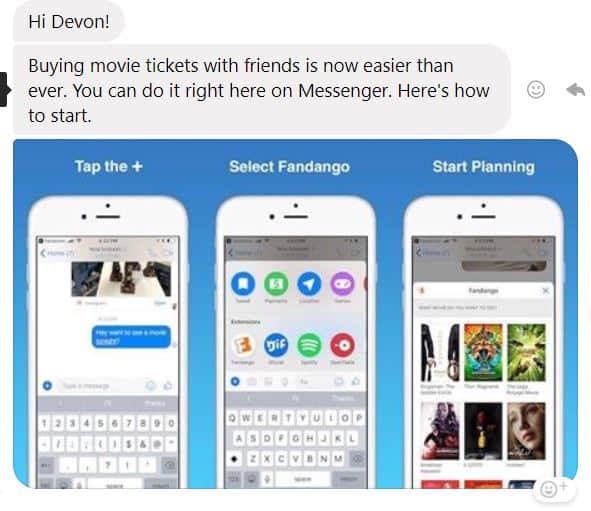
- Showcase Content: One great example of a chatbot that showcases content is Fandango's Messenger Bot. This chatbot gives consumers a cool interactive experience where they can see which movies are trending, watch trailers, and buy movie tickets. While there are several different ways to buy movie tickets, and what this chatbot ultimately accomplishes is not all too different, it's the experience that it gives users that sets it above the competition.
- Help Customers Make a Purchase: In-app chatbots can provide alternative ways for customers to make purchases. For example, the Domino's chatbot allows consumers to place an order for a pizza with their assistant, Dom. While it isn't too different from ordering a pizza the normal way, it's a bit more interesting, interactive, and helpful.
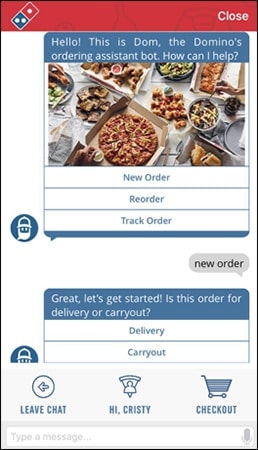
- Help Customers Make a Purchase: In-app chatbots can provide alternative ways for customers to make purchases. For example, the Domino's chatbot allows consumers to place an order for a pizza with their assistant, Dom. While it isn't too different from ordering a pizza the normal way, it's a bit more interesting, interactive, and helpful.
- Plan a Trip: Kayak's chatbot on Messenger allows consumers to find things to do, and book flights, rental cars, and hotels. If you type in, "Where can I go for $1000?", the bot will ask you for a location and then give you some destinations to choose from.
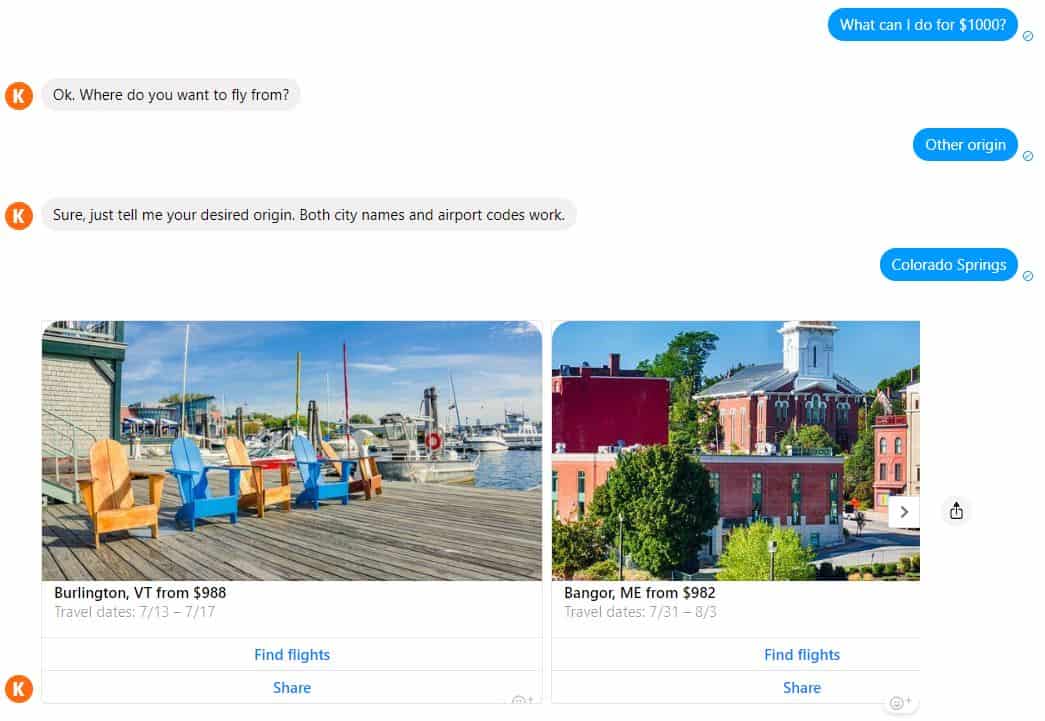
- Plan a Trip: Kayak's chatbot on Messenger allows consumers to find things to do, and book flights, rental cars, and hotels. If you type in, "Where can I go for $1000?", the bot will ask you for a location and then give you some destinations to choose from.
- Send Music to Friends: You can search Spotify's catalog on Messenger and send songs or playlists to friends. This is an excellent tool for people who are already on Messenger and saves them time from navigating to the Spotify app or browser and sharing the content that way.
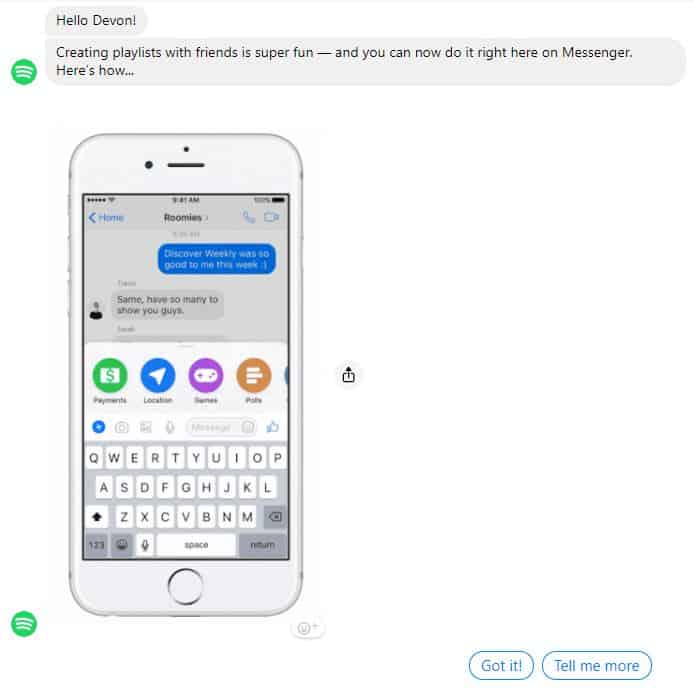
- Send Music to Friends: You can search Spotify's catalog on Messenger and send songs or playlists to friends. This is an excellent tool for people who are already on Messenger and saves them time from navigating to the Spotify app or browser and sharing the content that way.
- Upsell a Product or Service: A great example of a chatbot that does this is Sephora's Messenger bot. This chatbot allows the consumer to book a makeover, try out new products, provide store feedback, and be directed to customer support for human help.
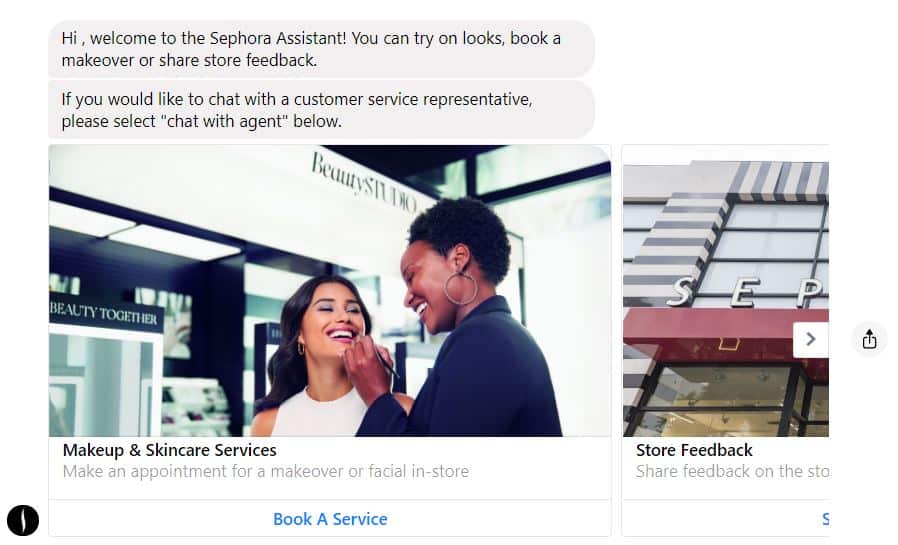
- Upsell a Product or Service: A great example of a chatbot that does this is Sephora's Messenger bot. This chatbot allows the consumer to book a makeover, try out new products, provide store feedback, and be directed to customer support for human help.
Conclusion
Chatbots have been growing in popularity over recent years, and businesses have been quick to pick up this new technology and reap its rewards. Take a look at some of your favorite brands and competitors and see if and how they are using chatbots for their business. There might be an opportunity for you to do the same thing.
Conversational marketing can provide another way for you to connect with your customers on the messaging platform of choice - it doesn't have to be intimidating either, with the right tools and a touch of creativity, it can be fairly easy to set up a chatbot for your business. So, what are you waiting for? Contact us today and find out how we can help you reap the rewards of this great marketing technology!
Let's bring the spotlight to your business today.
From brainstorming to implementation, AnoLogix has successfully designed, created, developed and implemented websites for people and businesses since 2000.
With AnoLogix your business can skyrocket. Do you want to learn how we can help?
or call us for a FREE consultation at (904) 807-8961